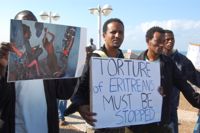ISRAEL: Eritreans Flee From Dictatorship to Detention

Standing across the street from the American embassy in Tel Aviv, more than 200 Eritrean asylum seekers chanted 'Yes to justice! Yes to humanity!', and demanded international intervention to stop torture camps in the Egyptian Sinai. Protests by African asylum seekers in Israel are growing, in the face of increasingly tough policies by the Israelis.
'We’re here to stop this torture and to call the world to be aware of this,' said Habtom Mehari, a 30-year- old Eritrean asylum seeker, at the rally Nov. 25.
'I came through Sinai and when I was coming four years ago, and it was not as problematic as it is now. Now it is a criminal organisation that puts people in a camp. It’s a very, very bad experience,' Mehari told IPS.
But after an arduous journey through Sinai — where reports of violence, rape, and torture at the hands of local traffickers are widespread — African refugees and asylum seekers are finding that their challenges continue once in Israel.
'I don’t believe that refugees are saved here in Israel. There are refugees here without any status, without any shelter,' said Haile Mengistaab, chairman of the Eritrean Community Committee in Israel, one of the largest groups among the estimated 27,000 refugees and asylum seekers living in Israel.
'Their lives are in danger. Starting from Eritrea to here in Israel, life remains precarious,' Mengistaab, who came to Israel a year ago, told IPS.
On Nov. 14, the Israeli Knesset’s Committee on Internal Affairs discussed an amendment to the country’s ‘Prevention of Infiltration’ law. The amendment would bring in a minimum three-year prison term for asylum seekers and their children, and a five-year prison term for those who offer humanitarian aid to refugees.
The declared purpose of the amendment is to deter asylum seekers from entering Israel. The Committee is expected to discuss it further Dec. 5 before passing it on to a vote in the Knesset.
'If you’re from a hostile place, like Darfur, you could be imprisoned indefinitely,' Sara Robinson, refugee rights coordinator of Amnesty International’s Israel section told IPS. 'This infiltration law has to be thought of as a package with the government decision to build a 10,000-bed detention centre in the south.'
In November 2010, the Israeli government approved a plan to build a massive detention centre in the Negev desert, to hold thousands of asylum seekers and their families before deportation. Israeli Prime Minister Benjamin Netanyahu said at the time: 'We must stop the mass entry of illegal migrant workers because of the very serious threat to the character and future to the state of Israel.'
At the cost of 1.35 billion Israeli shekels (400 million dollars), Israel is also currently constructing a fence along its border with Egypt, to keep African migrants out.
According to Robinson, Israel has to date recognised less than 200 asylum seekers as refugees, and hasn’t formulated a clear refugee status determination policy, despite the fact that it is a signatory to the United Nations’ 1951 Convention relating to the Status of Refugees.
'They’re trying to find ad-hoc solutions and a deterrence policy, and that’s not a refugee policy that respects human rights. They need to enact the 1951 Convention into domestic law,' Robinson told IPS.
'Israel needs to be following its international obligations which includes a fair, transparent refugee status determination system. Follow the law. We don’t have to re-invent the law; we just have to enact the legislation that exists and follow it,' she said.
According to Haile Mengistaab, the Israeli government must take its responsibility to protect Eritrean refugees and asylum seekers, not threaten them with imprisonment, since they have risked everything to flee dictatorship in Eritrea.
'This (new amendment) is illegal, irresponsible and unjust. We condemn the Israeli government for the detention of innocent refugees that claim asylum, and we are demanding the government of Israel amend their policy and give status to the refugees,' Mengistaab said.
'We are not infiltrators. We are here to get asylum, so there is no need to stigmatise us. We are refugees. We have been recognised as refugees in Europe, but here in Israel, (we have) zero status. Why? We are just demanding protection.'
© Inter Press Service (2011) — All Rights ReservedOriginal source: Inter Press Service
Where next?
Browse related news topics:
Read the latest news stories:
- In Gaza, a Christmas without a tree Wednesday, December 25, 2024
- Southeast Asia provides fertile ground for women to benefit from AI Wednesday, December 25, 2024
- General Assembly approves $3.72 billion UN budget for 2025 Wednesday, December 25, 2024
- This Year’s Three UN Summits Set the Stage for COP30 to Transform Food Systems Tuesday, December 24, 2024
- Civil Society Trends for 2025: Nine Global Challenges, One Reason for Hope Tuesday, December 24, 2024
- Innovative Financing to Unlock Africa’s Blue Economy Tuesday, December 24, 2024
- Its Very Tough: Turning Youth Employment Dreams Into Reality Tuesday, December 24, 2024
- Making the digital and physical world safer: Why the Convention against Cybercrime matters Tuesday, December 24, 2024
- Tchaikovsky and America: A mutual fascination Tuesday, December 24, 2024
- UN General Assembly adopts milestone cybercrime treaty Tuesday, December 24, 2024